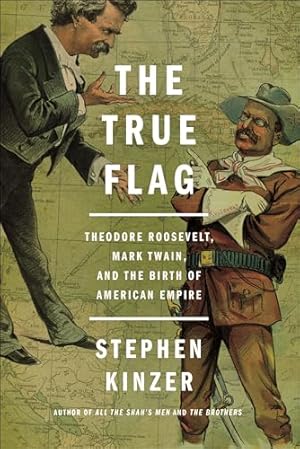These promotions will be applied to this item:
Some promotions may be combined; others are not eligible to be combined with other offers. For details, please see the Terms & Conditions associated with these promotions.
Your Memberships & Subscriptions

Download the free Kindle app and start reading Kindle books instantly on your smartphone, tablet, or computer - no Kindle device required.
Read instantly on your browser with Kindle for Web.
Using your mobile phone camera - scan the code below and download the Kindle app.

A Great and Rising Nation: Naval Exploration and Global Empire in the Early US Republic Kindle Edition
Conventional wisdom holds that, until the Spanish-American War of 1898, the United States was a feeble player on the world stage, with an international presence rooted in commerce rather than military might. Michael A. Verney’s A Great and Rising Nation flips this notion on its head, arguing that early US naval expeditions, often characterized as merely scientific, were in fact deeply imperialist. Circling the globe from the Mediterranean to South America and the Arctic, these voyages reflected the diverse imperial aspirations of the new republic, including commercial dominance in the Pacific World, religious empire in the Holy Land, proslavery expansion in South America, and diplomatic prestige in Europe. As Verney makes clear, the United States had global imperial aspirations far earlier than is commonly thought.
- LanguageEnglish
- PublisherThe University of Chicago Press
- Publication dateJuly 27, 2022
- File size4.3 MB
Shop this series
See full series- Kindle Price:$58.30By placing your order, you're purchasing a license to the content and you agree to the Kindle Store Terms of Use.
- Kindle Price:$162.28By placing your order, you're purchasing a license to the content and you agree to the Kindle Store Terms of Use.
- Kindle Price:$188.23By placing your order, you're purchasing a license to the content and you agree to the Kindle Store Terms of Use.
- Kindle Price:$299.52By placing your order, you're purchasing a license to the content and you agree to the Kindle Store Terms of Use.
Shop this series
This option includes 3 books.
This option includes 5 books.
This option includes 10 books.
This option includes 23 books.
Customers also bought or read
- The Response to Industrialism: 1885–1914 (The Chicago History of American Civilization)
 Kindle Edition$15.39$15.39
Kindle Edition$15.39$15.39 - The True Flag: Theodore Roosevelt, Mark Twain, and the Birth of American EmpireEditors' pick
 Kindle Edition$9.99$9.99
Kindle Edition$9.99$9.99 - Rebirth of a Nation: The Making of Modern America, 1877–1920 (American History)
 Kindle Edition$1.99$1.99
Kindle Edition$1.99$1.99 - The Reshaping of Everyday Life, 1790–1840: 1790-1840 (Everyday Life in America)
 Kindle Edition$10.44$10.44
Kindle Edition$10.44$10.44 - Revolutionary Spring: Europe Aflame and the Fight for a New World, 1848-1849
 Kindle Edition$4.99$4.99
Kindle Edition$4.99$4.99
Customers who bought this item also bought
Editorial Reviews
Review
“A Great and Rising Nation showcases thorough research, up-to-date historiography, and well-written prose. As a strong work of scholarship with no notable weaknesses, it should easily find a place on the shelves of scholars of maritime history and the early republic. The transnational nature and goals of the expeditions means that scholars in diverse fields may also find individual chapters useful. With compelling prose, gripping anecdotes, and clear ties to the broader themes and narrative of US history, the book could be assigned to students and be read by a broader audience.” ― H-Water
“Elegant, erudite, and adventurous, A Great and Rising Nation takes readers on a remarkable global voyage with the US Navy’s antebellum exploring expeditions. Crisply written and featuring a memorable cast of characters, this is a must-read for anyone interested in the early American republic, naval history, and the history of American empire.” ― Gautham Rao, American University
"While establishing itself as a continental power, the early American Republic asserted itself in the international sphere through a series of scientific expeditions aimed at expanding the country’s economic influence. In A Great and Rising Nation, Verney recounts how the various military expeditions accomplished not only their stated intentions but also the unstated goal of expanding US influence at a time when European interests dominated global economic systems. . . Recommended." ― Choice
"This rich and engaging book situates American naval exploration and science in the period between the War of 1812 and the Civil War, an era that re-shaped and popularized American political life, and greatly extended the territorial sway of the Imperial Republic, acquiring a Pacific coastline in the process. . . . Verney brings his expertise on the domestic political dimension to bear on the genesis, conduct and reception of five of the 17 naval expeditions of the period, emphasizing the divergent aims and ambitions of those who sponsored, supported and conducted oceanic missions." ― Naval Review
"The main merit of the book is that it draws attention to the fact that nationalism, state
formation, and foreign policy were already linked by naval means in the early and
antebellum US republic. This makes it instructive reading even to scholars of late nineteenth-
century US naval history." -- Johannes Nagel ― H-Net Reviews
“A Great and Rising Nation shows how naval exploration became both mass entertainment and a popular instrument of imperial power in the early American republic. This marvelous new study combines thrilling accounts of early US exploring expeditions from Fiji to the Arctic with an important argument about the relationship of domestic political process and empire building.” ― Amy S. Greenberg, Pennsylvania State University
“Using official expedition reports, popular sources reacting to expeditions, and a wealth of historiography, the author demonstrates that exploring expeditions became a vessel in which various antebellum interests competed for political legitimacy. His thorough seventy pages of notes and clear definition of terms makes A Great and Rising Nation easy for readers to follow. Verney poses new questions concerning the relationship of American empire, race, religion, gender, and the US Navy, all while including non-American voices in the study of these overseas expeditions. This book would be an excellent addition to the library of any North American, maritime, or global historian.” ― Northern Mariner
“Beginning in the early nineteenth century, the American Navy played a key role in extending the scope and reach of American influence in the world. Venturing to distant regions, the Navy engaged in a wide range of scientific, humanitarian, and political missions. Compelling and original, A Great and Rising Nation transforms our understanding of the origins and meaning of American imperialism.” ― Rosemarie Zagarri, George Mason University
“With its expansive narrative and sophisticated, penetrating insights, A Great and Rising Nation makes a genuine contribution to our understanding of the early American republic and its relationship to the wider world.” ― Brian Rouleau, Texas A&M University
“In addition to describing the progress and specific events of each expedition, Verney vividly relates each one to the sweeping social, political, and economic changes that characterized the antebellum United States.” ― Naval War College Review
About the Author
Product details
- ASIN : B0B7GMK3BT
- Publisher : The University of Chicago Press (July 27, 2022)
- Publication date : July 27, 2022
- Language : English
- File size : 4.3 MB
- Text-to-Speech : Enabled
- Screen Reader : Supported
- Enhanced typesetting : Enabled
- X-Ray : Not Enabled
- Word Wise : Enabled
- Print length : 308 pages
- Best Sellers Rank: #559,549 in Kindle Store (See Top 100 in Kindle Store)
- #484 in Military Naval History
- #1,336 in Military History of the United States
- #1,526 in Naval Military History
- Customer Reviews:
Customer reviews
- 5 star4 star3 star2 star1 star5 star100%0%0%0%0%100%
- 5 star4 star3 star2 star1 star4 star100%0%0%0%0%0%
- 5 star4 star3 star2 star1 star3 star100%0%0%0%0%0%
- 5 star4 star3 star2 star1 star2 star100%0%0%0%0%0%
- 5 star4 star3 star2 star1 star1 star100%0%0%0%0%0%
Customer Reviews, including Product Star Ratings help customers to learn more about the product and decide whether it is the right product for them.
To calculate the overall star rating and percentage breakdown by star, we don’t use a simple average. Instead, our system considers things like how recent a review is and if the reviewer bought the item on Amazon. It also analyzed reviews to verify trustworthiness.
Learn more how customers reviews work on AmazonTop reviews from the United States
There was a problem filtering reviews. Please reload the page.
- Reviewed in the United States on November 8, 2022A Great and Rising Nation covers U.S. naval explorations between the War of 1812 and the Civil War commonly referred to the antebellum period. The motives for these expeditions were varied but according to Michael Verney, they can all be viewed as extensions of the young nation’s desire to build an empire. Exactly what type of empire is envisioned varies such that the reader is introduced to empires of Knowledge, Commerce, Faith and Slavery. It’s this nexus of these unique and sometimes competing interests which make this book so fascinating.
While Verney doesn’t explicitly rank the various motivations for these naval expeditions, it’s clear from the first few pages that gaining the respect of the European nations, particularly as it relates to scientific exploration, is never far from top of mind. “By launching a national voyage of discovery, the United States would pay its cultural debt to European powers, establish valuable lines of trades with Pacific Islanders, enlarge the bounds of science,” and contribute “to the knowledge of men, and to the fame of the Nation.” As one character frames the argument to President Madison, “it’s time to put the United States on an eminence with others.” The U.S. Navy, occasionally in concert with private enterprise, would be the primary vehicle for bolstering the nation’s reputation as one worthy of respect for its scientific contributions. However, to fund and gain support for these expeditions at home, its promoters would also have to frame the benefits in terms of commerce, slavery and even religion.
The book opens with the story of newspaper editor and author Jeremiah Reynolds, who attempts to mount an expedition to the Pacific Ocean and South Seas motivated by a sense of adventure. (Reynold’s short story, “Mocha-Dick”, would serve as the inspiration for Moby Dick.) Despite his limited scientific background, Reynolds viewed the German explorer and polymath Alexander von Humboldt as his model. Alas, political machinations and infighting would stymie his quest to pursue an Empire of Knowledge. However, Reynolds would play a pivotal role in the launch of the Exploring Expedition in 1836 (Ex. Ex. for short) during Andrew Jackson’s administration. Whereas appeals to scientific advancement fell short, promises of trade and commerce won the day as Verney labels this expedition an example of the Empire of Commerce, and rightly so. Prior to the Ex. Ex., merchants and sailors were dependent on anecdotal commentary and unreliable evidence to navigate whereas the charts which the Ex. Ex. returned with made sailing in the Pacific and South Seas safer than ever. Unfortunately for the expedition’s leader, Charles Wilkes, his accomplishments were mired by an overbearing disposition as reflected in five separate court-martials. However, he would seek and find redemption in the publication of the expedition’s exploits, which was warmly received at home and abroad to such an extent that the lavishly engraved first editions were given as diplomatic gifts.
By far the most unique expedition is William Lynch’s voyage to the Dead Sea, which sought to verify the Bible as a historically accurate document. Moreover, his primary motivation for launching the expedition was to refute the beliefs of certain Christian sects such as the Unitarians, Catholics and Orthodox in favor of the Protestant Evangelical biblical interpretation. (The fact that the expedition would be dependent on Muslims for its safety and passage is more than a bit ironic.) While the results of the expedition are debatable, it does seem to have made some diplomatic in-roads.
As for the Empire of Slavery, the United States’ attempt to conquer South America in order to extend slavery would be impressive in its ambitions if it was not so tragic in its motivations. Nowhere is this dichotomy better reflected than in the person of the brilliant cartographer Matthew Maury. While naval explorers returned to Washington with the belief that the Amazon River Valley was perfect for colonization, the Brazilians were wise to the game after watching the U.S. annex Texas. Likewise, internal politics at home and arrogance aboard prevented the U.S. from mapping the Rio de la Plata.
The final chapter returns to the theme of the young nation seeking and gaining respect from its European cousins as it participates in the search for the explorer Sir John Franklin. In particular, it offers a lovely insight into the special relationship that seems so one-sided today.
If there is any quibble with this work, it’s that the cameos are in danger of overshadowing the main players. From Edgar Allen Poe and Herman Melville to the creation of the Smithsonian Institution to encroaching tremors of war, the reader can’t help but want to pursue these tangents further than the brief context the author provides. Regardless, A Great and Rising Nation is a fine piece of scholarship on the U.S.’s attempt to balance a desire to pursue imperial ambitions abroad while managing increasingly unmanageable tensions at home.
Greg McNiff
Executive Director
NYMAS.org
- Reviewed in the United States on March 16, 2023Dr. Verney is a brilliant teacher and an accomplished historian. This book is a testament to the skill he brings to his craft. "A Great and Rising Nation" is a beautifully written, deeply researched work on the United States' encounters with the world - from the South Pacific to the Middle East to the Arctic - in the decades preceding the Civil War. Americans of that time were not inattentive to the world beyond their borders. Exploration and search-and-rescue expeditions enabled the country to claim international prestige and to meet a benchmark of "civilization" in the eyes of European powers, notably by contributing to a worldwide "republic of knowledge" and meeting certain standards of whiteness and masculinity. The U.S. Navy became the pride of the nation as ordinary Americans voraciously read newspaper reports about foreign lands and the memoirs of expedition officers. These voyages broadened the horizons of the United States; "A Great and Rising Nation" now broadens our historical horizons. Even Early Republic scholars stand to learn a great deal from this little-known slice of U.S. history. I highly recommend this book.






























